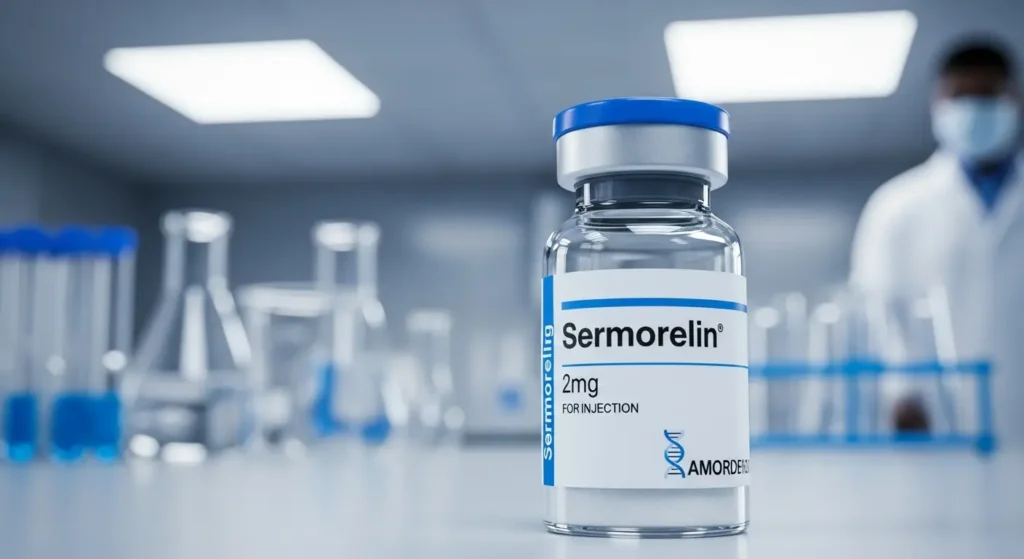Worried, does Sermorelin cause hair loss? You may have heard conflicting reports—some claim it improves hair growth, while others fear it could trigger shedding.
This article separates fact from myth by explaining how Sermorelin works, examining its effects on hair health, reviewing side effects, and sharing expert insights.
By the end, you’ll know what science really says, what to watch for, and how to use Sermorelin safely while protecting your hair.
Understanding Sermorelin

What is Sermorelin and How It Works
Sermorelin is a synthetic peptide that mimics growth hormone–releasing hormone (GHRH). Instead of injecting growth hormone directly, it stimulates your pituitary gland to naturally produce and release human growth hormone (HGH). This indirect method is often considered safer and more physiologic than HGH therapy.
- Mechanism: Binds to receptors in the pituitary → stimulates HGH release → increases IGF-1 production in the liver → supports tissue repair, metabolism, and growth.
- Why it matters: HGH and IGF-1 play important roles in skin elasticity, cellular repair, and hair follicle activity.
Approved Uses vs. Off-Label Applications
- FDA-approved: Treatment of growth hormone deficiency in children.
- Off-label (adults): Commonly used in anti-aging protocols, body composition improvement, recovery optimization, and sometimes as part of hair and skin rejuvenation therapies.
Sermorelin and Hair Health — The Biological Mechanisms
How Sermorelin May Support Hair Growth
While not developed as a hair loss treatment, Sermorelin’s systemic effects may benefit hair indirectly:
- Enhanced scalp circulation: HGH increases nitric oxide activity, improving blood flow to the scalp.
- Protein synthesis: Boosts collagen and keratin production, essential for strong, thick hair.
- Anagen phase support: May help prolong the growth phase of hair follicles, reducing premature shedding.
Potential Influence on IGF-1 and Cellular Regeneration
IGF-1 (insulin-like growth factor 1) is strongly linked to follicle stem cell activity. Higher IGF-1 levels encourage follicle regeneration and stronger growth cycles. Sermorelin’s ability to raise IGF-1 indirectly makes it biologically plausible that it could support hair maintenance rather than trigger loss.
Does Sermorelin Cause Hair Loss? Evaluating the Evidence
What Current Research and Sources Say
- Scientific evidence: Currently, no published clinical studies directly link Sermorelin to hair loss. Most available research focuses on growth hormone regulation, metabolism, and aging.
- Medical consensus: Endocrinologists generally do not list hair loss as a common side effect of Sermorelin.
Anecdotal or Conflicting Reports
Some clinics and patient forums mention changes in hair texture or mild thinning in rare cases. However:
- These are anecdotal, not supported by controlled trials.
- Other reports suggest Sermorelin improved hair thickness or slowed shedding, likely due to metabolic benefits.
Possible Contributing Factors Behind Perceived Hair Loss
When patients notice hair shedding during Sermorelin therapy, other explanations are often more likely:
- Underlying health issues: Thyroid disorders, anemia, or genetic predisposition.
- Hormonal shifts: Natural fluctuations in testosterone, estrogen, or DHT can influence hair independently of Sermorelin.
- Dosage or compounding quality: Variability in peptide preparation may cause unintended side effects.
- Concurrent treatments: Use of medications like finasteride, testosterone therapy, or steroids could confound the results.
Side Effects of Sermorelin: What to Know
Common Side Effects
- Injection site redness or pain
- Headaches or dizziness
- Nausea or flushing
- Sleepiness or restlessness
Hair-Specific Effects
- Not commonly reported in clinical data.
- Rare anecdotal reports of hair shedding exist but lack confirmation.
When to Consult a Doctor
Seek medical advice if you notice:
- Sudden or rapid hair shedding
- Patchy bald spots
- Scalp irritation or inflammation
- Any systemic side effect that worsens with continued use
Safe Use Tips & Hair Optimization Strategies
Recommended Monitoring Schedule
- 3 months: Assess energy, sleep, and any hair or skin changes.
- 6 months: Recheck IGF-1 levels, adjust dosage if necessary.
- 12 months: Evaluate overall benefits and long-term tolerance.
Nutrition & Lifestyle Support
- Eat a diet rich in iron, zinc, omega-3s, and biotin.
- Stay hydrated to support scalp circulation.
- Manage stress, as cortisol disrupts follicle cycles.

Gentle Hair Care
- Avoid frequent heat styling or harsh chemicals.
- Limit tight hairstyles that cause traction alopecia.
- Use sulfate-free shampoos designed for thinning hair.
Quality of Therapy
- Ensure Sermorelin is sourced from a reputable compounding pharmacy.
- Work only with a licensed physician for dosing and monitoring.
FAQs — Addressing Reader Concerns
Does Sermorelin cause hair loss?
No strong evidence supports Sermorelin as a cause of hair loss. In most cases, it is neutral or potentially beneficial for hair health.
Can Sermorelin actually help hair grow thicker?
Yes, by boosting IGF-1 and collagen production, it may indirectly improve follicle strength and density.
How long before hair improvements (or issues) appear?
Most users notice changes within 3–6 months, though results vary.
Should I stop Sermorelin if I notice shedding?
Not necessarily. Mild shedding could be coincidental. Always consult your doctor before stopping therapy.
Will Sermorelin affect men and women differently?
Effects are generally similar, but the underlying hormonal balance may influence outcomes.
Are there clinical trials specifically on hair outcomes?
Currently, no large trials focus solely on Sermorelin and hair. More research is needed.
Bottom Line
There is no strong scientific evidence that Sermorelin causes hair loss. Instead, its role in stimulating HGH and IGF-1 suggests it may support healthier hair cycles for some individuals. However, anecdotal cases of shedding highlight the importance of individualized monitoring.
If you are concerned about hair changes during Sermorelin therapy, the best step is to consult a qualified medical professional who can evaluate your unique situation and rule out other causes.
Concerned about hair loss while on Sermorelin or looking for expert guidance on hair restoration? Book a consultation with Dr. Rana Irfan in Islamabad today to receive personalized, medically supervised solutions for both hormone therapy and hair health.
